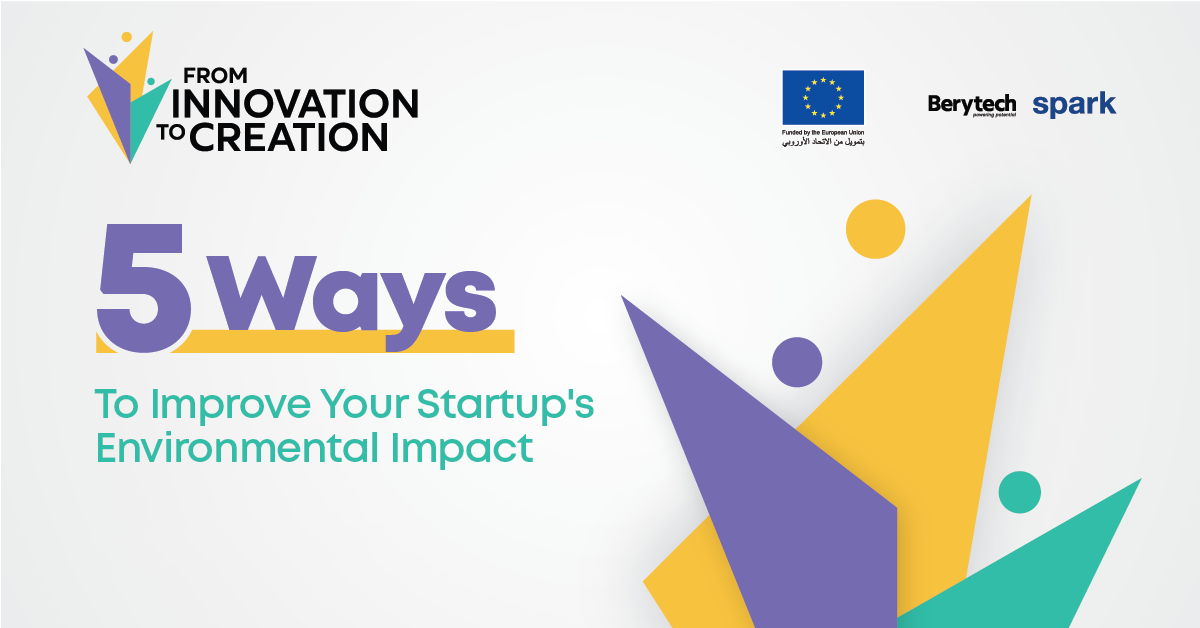Improving your Startup’s Ecological Impact and Sustainability through Green Practices
In today’s developing landscape, the role of startups in tackling sustainability challenges is essential. Topics such as clean energy, health treatments, and innovative solutions nowadays should manage pollution, sustainability regarding resources, and the spread of diseases, especially with climate change impacting the land during the current era. Adding to the shift to renewable energy, startups also focus on inventing clean technologies to help reduce the environmental impact in production areas covering food, reducing waste, and tackling air pollution. Understanding the dynamics of the knowledge flood, funding landscapes, and the impact of environmental policies is required.
Knowledge Spillover
- Green Knowledge: Green knowledge won’t only shape the path of any startup but also empower traditional industries. An example of that is the Mouneh scene that escalated in Lebanon after applying innovation to it, and that’s how the country started observing different methods of creation when it comes to thinking about this traditional asset.
- How is it spread? Knowledge can spread in a city as workers move across firms; the same happens in agriculture. It is the humans who have been learning and empowering methods.
To understand the impact of this aspect, this article will refer to experts in the field of startups, sustainability, and ecology. Layan Bekai, Mostafa Khalil, and Youmna Iskandarani will give their insights by discussing a roadmap that enables a better ecological impact. These elements will provide methods to help startups figure out their journey toward a more environmentally conscious world.
In this regard, Layan Bekai, an experienced Management Consultant, discusses the integration of gamification into sustainability actions, turning eco-goals into engaging challenges that enhance excitement.
- Recycling alongside energy conservation: According to Layan, the integration of gamification will create an element of competition and engagement within the startup, leading to discovering a purpose among mainly environmentally oriented colleagues. This shift in eco-goal practice falls under the umbrella of green entrepreneurship. It makes sustainability simpler and more engaging throughout a startup’s journey.
Integrating Sustainable Practices to Attract Investors
- Climate change and shifting to a resource-efficient economy: This has created multiple global actors intending to solve environmental issues. Experts agree that within the past decade, entrepreneurs, through their startups, have become oriented toward solving the most pressing societal challenges through business models and technological, financial, and social innovations.
In this regard, Digital Marketing Consultant Mostafa Khalil offers entrepreneurs insights to communicate their impact better. In an interview with Berytech, he stresses the importance of integrating sustainable practices.
- Transparent communication: This happens by advising entrepreneurs to go beyond the financial realm and encourage a holistic sustainability approach. Khalil believes that incorporating sustainable practices within a startup affects every aspect of the business, from sourcing materials and energy to waste management, mentioning that “engaged and informed employees can be powerful advocates for your green initiatives.”
Advocating for renewable energy sources, reducing water consumption, and recycling waste or reusing materials are all considered ways to support a startup’s green practices. A big part of education is done through advocacy, which requires minimal assets, such as offering employees training on sustainability topics and providing resources to help reduce environmental footprint. - Key Performance Indicators (KPIs): Startups aiming to produce goods can track their environmental impact using key performance indicators (KPIs), such as measuring their carbon footprint, energy usage, and waste generation. This valuable data allows the startup to set targets for improvement, communicate the progress to stakeholders, publish it on the website, and show it to customers, investors, and the public. Such aspects will attract investors, considering that investors might have extra knowledge regarding policies and what can benefit them and the startup shortly.
International Conferences, Green Innovation, and Development Practices
- Sustainable Development and Green Innovation: This is a significant topic since countries worldwide are formulating environmental regulations to take a more assertive stance toward green innovation and shifting from fossil fuels. The annual United Nations Climate Change Conference (Lately COP 28, hosted in Dubai, UAE) is a significant event for policymakers. Such international conferences shape the world of startups since they affect policies and the production of raw materials. They set a roadmap for the world with its mega-companies to startups.
Food expert and Business Development Specialist Youmna Iskandarani suggests that nowadays, discovering bottlenecks in the system requires documentation as a critical element, with all its shapes and formats, whether ideas, advice, tips, or more technical, knowing the type and quantity of waste produced at a facility is crucial to keep going. - Embracing sustainable practices: This point focuses on including sustainability in every business element, from the sourcing phase to manufacturing and distribution or disposal. Iskandarani encourages startups to keep an open mind through research, stating, “Have the researcher spirit within you.” At the end of the day, knowledge spillover is done through collaboration, learning from others, and communication is always crucial. When asked about an example, she adds, “Collaborate with other businesses, organizations, and experts in the sustainability space to share knowledge and resources.”
Benefit from being trapped within the Green Prison Boundaries
- Effective Policy Design: Strict policies may be necessary to transition to a low-carbon economy, but more is needed to motivate new startups. Policies should also be adjusted to suit a national or regional entrepreneurship ecosystem. Policymakers should consider entrepreneurs as essential players in reducing carbon emissions. Simultaneously, entrepreneurs should not consider themselves trapped in “the green prison”, But instead, leverage these policies to “greenify” their processes and impact. The green prison refers to a situation in which entrepreneurs in the climate-tech or green technology sector find themselves constrained or trapped within policies.
About the program: Berytech Implementing the ‘From Innovation to Creation’ Program
- From Innovation to Creation Program: The program aims to enhance the capabilities of innovation stakeholders in Lebanon. Funded by the European Union and implemented by Berytech in partnership with Spark, it actively engages in social and green entrepreneurship. This program aims to boost the capabilities of established and emerging innovation support organizations, such as tech hubs, accelerators, incubators, university entrepreneurship centers, and organizations, by supplying them with the needed knowledge and means to sustain the development and growth of social and green startups.
- Berytech’s Role: This program aims to implement various activities for selected innovation stakeholders through training in social and green entrepreneurship by doing boot camps to create an environmental impact. This will enable these organizations to enhance their services for startups, making them more oriented towards impact.
Conclusion
Collaboration can be vital in promoting cultural change and solving innovation challenges. Yet, organizations must demonstrate effective knowledge management and learning processes. In today’s evolving business world, environmental and social impact has become essential for CSR purposes and business growth. Startups can now use sustainable approaches to reach their business goals, such as attracting investors and opening new markets.










